We have collected consultation examples from many foreign nationals living within Akita Prefecture into this Q&A collection. At times such as when you have some trouble, or people such as your family or friends consult you about something, feel free to make use of this Q&A collection.
- What is status of residence?
-
Status of residence is a necessary status for you to live in Japan.
Depending on the status of residence type, the conditions of how long you can stay in Japan, what type of job you can do, and so forth, are different.
In cases such as sightseeing for 90 or fewer days, or coming to see family in Japan, you will receive a "Temporary Visitor" status of residence.
- I received a "Residence Card" when I arrived in Japan. At what sorts of times is this card used?
-
Your residence card shows information such as your status of residence type, your period of stay, whether you can work, and so forth.
It is proof of your right to be in Japan. It is an incredibly important card, so carry it with you at all times.
Residence Card front Residence Card back 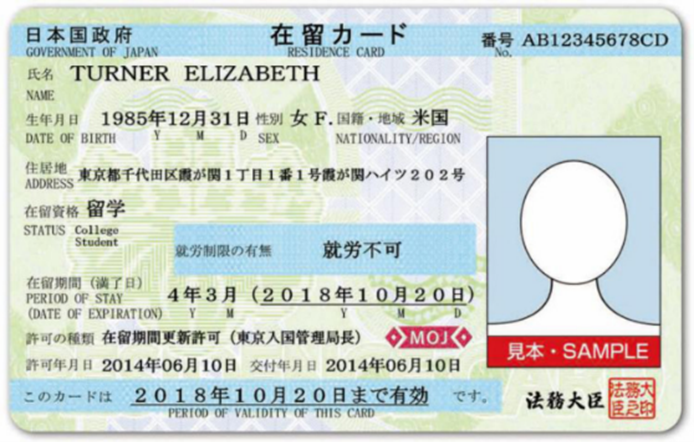
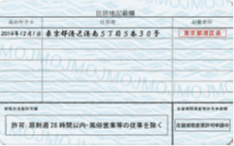
From the Immigration Services Agency's website, March 1st, 2022
- What should I do when I want to change my status of residence or extend my period of stay?
-
Depending on factors such as your status of residence or living conditions the needed paperwork will vary. Ask the Immigration Services Agency, an information center, or some other authority for details.
Question counters related to status of residence - My Japanese husband has passed away. Is it possible for me to continue living in Japan?
-
If your status of residence is "Spouse or Child of Japanese National", then when your current period of stay expires, your status of residence will also become invalid. To find out what procedures are necessary to continue living in Japan, ask the Immigration Services Agency.
Question counters related to status of residence※The same applies to foreign nationals who divorce their Japanese spouse.
※Within 14 days of divorce, or your spouse passing away, or so on: contact the Immigration Services Agency of Japan and do any necessary paperwork. - What type of paperwork is necessary in order to continue living in Japan forever?
-
If you obtain permanent residency, you can live in Japan forever without changing your status of residence or period of stay. Ask the Immigration Services Agency for details about applying for permanent residency.
Question counters related to status of residence - I want to invite my (biological) child from my home country to come live in Japan with me. What should I do?
-
Children need a visa and status of residence. Ask the Immigration Services Agency, an information center, or some other authority for details.
Question counters related to status of residence
Depending on the child's age, it is also necessary to think about sending them to school. Check here for details.
More information
differences between visa and status of residence
Visa…Visas are obtained from a Japanese embassy or consulate in the home country before arriving in Japan, and is issued by the Ministry of Foreign Affairs.
Status of residence…Status of residence is obtained when entering Japan, and is issued by the Immigration Services Agency.differences between "Spouse or Child of Japanese National" and "Permanent Resident" status of residence
Spouse or Child of Japanese National Permanent Resident Period of Stay 6 months, 1 year, 3 years, 5 years
(Renewal is necessary)Unlimited
(Residence Card renewal paperwork is necessary)In the case of divorce or the death of the Japanese spouse In this case the status of residence cannot be renewed, so a new status of residence must be obtained in order to continue residing in Japan.
※After the divorce or death, you can stay in Japan until the current status of residence expires.This does not affect your status of residence, so you can continue to stay in Japan. - 「Permanent Residency」means that an individual has the right to live permanently in Japan while retaining their foreign nationality. Apply for permanent residency at the Immigration Services Agency of Japan. Permanent Residency is one type of residency status.
- 「Naturalization」refers to a foreign national obtaining Japanese citizenship, thereby becoming a Japanese person. Apply at the Legal Affairs Bureau.
Akita Regional Legal Affairs Bureau, Family Registration Division
Telephone:018-862-1129
Available days and times:8:30 - 17:15 (Weekdays only)related to education and bringing children from overseas
Before bringing a child to Japan from overseas think carefully about the following issues
- The child's age
- The child's Japanese language ability
- Education in Japan
- 「Permanent Residency」means that an individual has the right to live permanently in Japan while retaining their foreign nationality. Apply for permanent residency at the Immigration Services Agency of Japan. Permanent Residency is one type of residency status.
- My family and friends want to come to Japan for sightseeing. What kind of paperwork is needed?
-
Whether a visa is needed depends on your family or friend's nationality. Ask an embassy or consulate in your home country for details.
- Can I renew my passport in Japan?
-
Procedures for renewal or extension of duration for passports may be done in Japan at an embassy or consulate of your home country. Check with an embassy or consulate of your home country for details.
Furthermore, in Akita and Iwate Prefectures, as well as other places, there exist "one-day consular service events" for China and the Philippines. At these events, you can renew your passport, consult with the consulate, and receive other services in Akita and Iwate Prefectures, and other places. Ask a consulate about when and where one day consular service events are taking place.
- I lost my passport. Who should I notify?
-
If you lose your passport, or it is stolen, or so on, immediately go to the nearest police box (place where there are police officers). Then, contact an embassy, consulate, or other authority of your country in Japan and tell them about what happened.
More information
transfer of endorsement for passports
If your passport has an endorsement such as for entry or re-entry into Japan, the renewed passport will not have this endorsement. It is possible to have the Immigration Services Agency transfer such endorsements to the new passport (In the case this is not noted on the new passport, it will be necessary to carry both passports until the end of the period of stay).
- Teach me about paperwork for international marriage.
-
When marrying in Japan, submit a registration of marriage to your city hall, or other public office in your town, village, or other location. Also be sure to inform your country's embassy, consulate, or other authority. Necessary procedures differ by country.
More information
marriage of a foreign national to a Japanese national
When a foreign national marries a Japanese national in Japan, normally the marriage procedures for both countries must be completed. In cases where the procedures for only one country are completed, there are cases where the other country does not recognize the marriage, leading to various problems.
There is the method of first completing marriage procedures in the Japanese system and then notifying the foreign country, as well as the method of completing marriage procedures in the system of the foreign country and then notifying Japan. Depending on the country there are also cases where the latter procedures become very simple.
marriage between two foreign nationals
In the case of marriage between two foreign nationals in Japan, necessary procedures vary greatly depending on country, so be sure to confirm what is necessary with relevant embassies and consulates in Japan.
Furthermore, since there is no problem with also completing marriage procedures in Japan, confirm with your local public office for necessary paperwork when completing marriage procedures in your municipality. Of course, you must also inform your home countries.
- I have become pregnant. What kind of preparation and paperwork are necessary for giving birth in Japan?
-
First, go to your city hall or public office of your town or village, and submit a pregnancy notification. From pregnancy until birth, and then after the child is born, there is a lot of paperwork to do.
Please check here for more details.
- I have a baby who was just born. I have heard that I need to have a lot of vaccinations done for the baby. However, I don't understand very well when I should have vaccinations done, and for which diseases.
-
Ask the baby's regular physician (the doctor who examines the baby when they get sick), your city's, town's, or village's health center or public health center, or another professional. There is also a vaccination schedule written in the Maternal and Child Health Handbook. If you want to know about illness, vaccination, and related topics in another language, view the Vaccination and Children's Health Pamphlet at the following URL.
Public Foundation of Vaccination Research Center Homepage
Vaccination and Children's Health Pamphlet, foreign language version
(English, Chinese, Korean, Vietnamese, Spanish, Portuguese, Thai, Indonesian, Tagalog, Nepali) - I have a 2 year old child. I am not working, so during the day the child and I are mostly passing the time inside the house with just the two of us. My stress is building up, and my physical condition isn't well.
-
There exist places (child care support centers) where you can consult about raising children, exchange information with others while playing together with your child, and more. There is also a service to have your child watched by someone else for a short amount of time. The specific services are different depending on what city, town, or village you live in, so please consult at the counter of your local public office.
- I want to start working. Is there a place that can look after my small child while I am working?
-
Depending on factors such as the age of the child and situation of the guardians, the places (facilities) that can look after your child are different. The characteristics of each are also different, so please look at the table below.
Facility Name Child's Age Usage Time Guardians Who Can Use the Facility Facility Purpose Kindergarten 3-5 years Morning-Afternoon Anyone Teaches early childhood education Day Care Center 0-5 years Morning-Evening Guardians who cannot care for children at home due to work, illness, etc.
Takes care of children in place of guardians Certified Early Childhood Center 0-5 years Morning-Evening 0-2 years: Guardians who cannot care for children at home due to work, illness, etc.
3-5 years: Anyone
Carries out education and childcare 3-5 years
Morning-Afternoon Regional Model Childcare 0-2 years Depends on the city, town, or village you live in The cost needed to use the facility also depends on factors such as the person and the facility. For details, please ask at the public office for the city, town, or village in which you live.
For information about kindergartens, please ask each kindergarten directly. - What kind of paperwork is needed for a divorce?
-
When divorcing in Japan, you must submit a notification of divorce to your city hall, or other public office in your town, village, or other location. Also be sure to inform your home country's embassy, consulate, or other authority.
Necessary procedures vary by country.Consultation relating to procedures in Japan
- Japan Legal Support Center in Akita
Telephone:050-3383-5550 / 0570-078386
Available days and times:9:00-17:00(Weekdays only)
- Akita Bar Association Legal Consultation Center
Telephone:018-896-5599
Available days and times:9:30-16:30(Weekdays only) - Free legal consultation center operated by municipalities
- Japan Legal Support Center in Akita
- My Japanese husband says he is submitting a divorce notification to the government office, but I don't want a divorce. What should I do?
-
Even if you don't want to be divorced, if the government office accepts a divorce notification, you will become divorced. If you don't want to be divorced, go to your Japanese husband's place of origin, or the government office of where they live, and submit a request to not accept divorce notification, which will prevent the government office from accepting a divorce notification.
More information
international divorce
In the case that a foreign national and Japanese national, or two foreign nationals, wish to get a divorce in Japan, then divorce procedures must be completed in all countries where marriage procedures were completed. If you only complete the procedures in Japan, but not your home country, then you will still be married in your home country. This will cause various problems, including if you wish to marry again, so don't forget to submit needed documentation. Contact an embassy or consulate in Japan for details.
regarding divorce procedures in Japan
There are 4 methods for getting divorced
- Divorce by agreement
Spouses discuss together and agree to divorce. - Divorce by mediation
After a family court listens to each spouse individually, spouses discuss together and agree to divorce. - Divorce by court judgment
When agreement cannot be reached through discussion, a family court decides on a divorce. - Divorce by court order
A family court decides on divorce through a court order.
status of residence after divorcing a Japanese national
If a foreign national is separated from a marriage with a Japanese person by death or divorce, then their Spouse or Child of Japanese National residency status will continue until the expiration date, but it cannot be renewed after that. Make certain to notify the Immigration Services Agency of Japan within 14 days of being separated by death or divorce. If you wish to continue living in Japan, then you must obtain a different residence status. For details, ask the Immigration Services Agency of Japan.
remarriage
In Japanese law, a woman cannot remarry until 100 days have passed since divorce. However, there are exceptions, such as in the case of remarrying the former husband, so check with the public office of your municipality. In the case of a female foreign national performing remarriage procedures in Japan, she must wait for not only the remarriage waiting period in Japan, but also any such waiting period defined in the laws of her home country.
- Divorce by agreement
- I'm going to divorce my Japanese husband, but I still want to raise my children. What will happen to my children when I get a divorce?
-
When divorcing, it is necessary to decide if you or your husband will raise your children. Discuss with your husband about who will have custody (the right to raise the children).
- Japan Legal Support Center in Akita (Lawyer/Law Consultation)
Telephone:050-3383-5550 / 0570-078386
Available days and times: 9:00-17:00(Weekdays only)
Address:Hokuto Bank Building 6th floor, 5-1-51 Nakadori, Akita City - Japan Legal Support Center Multilingual Information Service
Telephone:0570-078377
Available days and times: 9:00-17:00(Weekdays only)
Available foreign languages: English, Chinese, Korean, Spanish, Portuguese, Vietnamese, Tagalog, Nepali, Thai, Indonesian
- Japan Legal Support Center in Akita (Lawyer/Law Consultation)
- I am suffering physical domestic violence from my husband. I can't speak Japanese well, and there is nobody around me who I can consult with, so I don't know what to do.
-
Don't worry alone, ask for help. If consulting in Japanese is difficult, there are also places where you can get help in foreign languages.
Phone Number Available days and times Available foreign languages/strong> Consultation Center for Women
018-835-9052
0120-783-251(*)8:30-21:00
(Weekdays)9:00-18:00
(Weekends and holidays)ー Akita Prefectural Police Headquarters
Emergency Number for Women0120-028-110 24/7 ー Yorisoi Hotline 0120-279-338 Available languages vary by day and time.
For detailed information, check the Yorisoi Hotline Facebook.English
Korean
Chinese
Tagalog
Vietnamese
Nepali
Portuguese
Spanish
Thai
Indonesian(*)Not available outside the prefecture or by cellular phone
More information
violence from spouses or significant others
Domestic violence is not limited to physical abuse. It refers to physical abuse (hitting/kicking/throwing objects), mental abuse (insults/yelling/neglect), sexual abuse (unwanted sexual activity/refusal to cooperate with contraception), economic abuse (not providing living expenses/obstruction of working outside the home), societal abuse (limiting, monitoring, etc. someone's movements, relations with others, etc.) and so on.
- I am looking for a job in Akita. How should I go about my job search?
-
It is possible to consult regarding work at Hello Work (Public Employment Service Center). Consultation is free. Before searching for a job, confirm your status of residence and period of stay, and whether your status of residence allows you to work.
More information
for foreign nationals working in Japan
For a foreign national to work in Japan, their status of residence must permit them to work. Anyone in violation of this will be working illegally and be subject to punishment. For example, status of residence such as "Student" and "Dependent" do not allow one to work, but if you receive "Permission to Engage in Activity other than that Permitted under the Status of Residence Previously Granted" from the Immigration Services Agency, it is possible to work a part-time job for a limited amount of hours. Even for someone whose status of residence allows them to work, if they want to engage in work outside the field of that allowed by their status of residence (for example: receiving pay for interpreting under a Skilled Labor status of residence), they will need "Permission to Engage in Activity other than that Permitted under the Status of Residence Previously Granted".
- I have learned that my hourly wages are lower than Akita Prefecture's minimum wage. Is it because I'm a foreign national?
-
In Japan, there is a law known as the "Minimum Wage Act" (which dictates that it is unlawful to pay workers wages below a predetermined minimum wage). Foreign and Japanese nationals are both protected equally under this law. Please consult with someone if you have worries such as your wages being below minimum wage, if you are being made to work during breaks, or so on.
- Akita Labour Bureau, General Labor Consultation Corner
Telephone:018-862-6684(Japanese only)
Available days and times:8:30-17:15(Weekdays only)
- Labour Standards Advice Hotline
Available Language Phone Number Available days Available Times English 0120-531-401 Every day ・Weekdays (Monday-Friday)
5 PM-10 PM・Saturdays/Holidays
9 AM-9 PMChinese 0120-531-402 Tagalog 0120-531-405 Tuesday, Wednesday, Saturday Vietnamese 0120-531-406 Wednesday, Friday, Saturday Nepali 0120-531-408 Wednesday, Sunday Korean 0120-613-801 Thursday, Sunday Indonesian 0120-613-803 If you are a Technical Intern
Consultation in various languages by the Organization for Technical Intern Training (OTIT)
Available Language Available days and times Phone Number Consultation Site URL Vietnamese Monday-Friday
11:00~19:00
Saturday
9:00~17:000120-250-168 https://www.support.otit.go.jp/soudan/vi/ Chinese Monday, Wednesday, Friday
11:00~19:00
Saturday
9:00~17:000120-250-169 https://www.support.otit.go.jp/soudan/cn/ Indonesian Tuesday and Thursday
11:00~19:000120-250-192 https://www.support.otit.go.jp/soudan/id/ Filipino Tuesday and Thursday
11:00~19:00
Saturday
9:00~17:000120-250-197 https://www.support.otit.go.jp/soudan/phi/ English Tuesday and Thursday
11:00~19:00
Saturday
9:00~17:000120-250-147 https://www.support.otit.go.jp/soudan/en/ ※Unavailable New Year Holidays (December 29th-January 3rd) and other holidays
More information
laws related to labor
Labor standards laws apply to any foreign national working in Japan.
"Labor Standards Act" Specifies labor conditions such as wages, pay to employees during business suspension, working hours, etc., at the time of contracting.
"Minimum Wage Act" Prevents wages below the minimum wage established for the relevant area. (As of March 1st, 2022, minimum wage in Akita Prefecture is ¥822 per hour)
"Workers' Accident Compensation Insurance Act" Provides for compensation via Worker's Accident Compensation Insurance in events of work related or commuting accidents.
There is a pamphlet published that is related to the Labor Standards Act. It is called the Working Conditions Handbook (in Japanese, English, Chinese, Korean, Tagalog, Thai, Vietnamese, Nepali, etc.).
The leaflet can be downloaded from the Ministry of Health, Labour and Welfare's homepage, or you can contact your nearby Labour Standards Inspection Office.What happens if I quit my job?
Various kinds of procedures are necessary after quitting a job. For details, ask a nearby Hello Work, or the Akita Labor Bureau, Employment Security Department, Employment Security Division (Telephone: 018-883-0007).
Labor Standards Inspection Offices
Labor Standards Inspection Offices in each area offer labor related consultation regarding matters such as failure to protect labor laws, unjust dismissal, failure to pay wages, and so on.
- Akita Labour Bureau, General Labor Consultation Corner
- I want to go to the hospital, but I can't speak Japanese.
-
If you cannot go to the hospital with someone who can speak Japanese, you can use the Multilingual Medical Questionnaire.
This questionnaire is designed for foreign nationals living in Japan to be able to explain their injuries, sicknesses, and so forth to doctors when they go to a hospital.It is divided into 11 medical departments and translated into 18 languages.
- Tell me about Japan's public health insurance program.
-
There are two kinds of public health insurance in Japan (insurance for illness, injury, etc.): Employee Health Insurance and National Health Insurance. Those working at a place like a company will be enrolled in Employee Health Insurance, while others will be enrolled in National Health Insurance. Anyone who is enrolled in either will receive a Health Insurance Card. If you bring your Health Insurance Card with you to the hospital when suffering from injury, illness, or so on, you will only have to pay 30% of the hospital fees.
Health Insurance Card front Health Insurance Card back 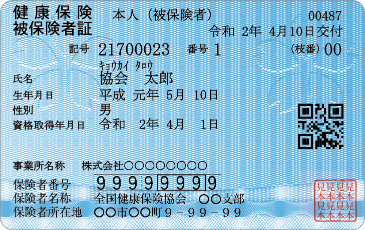
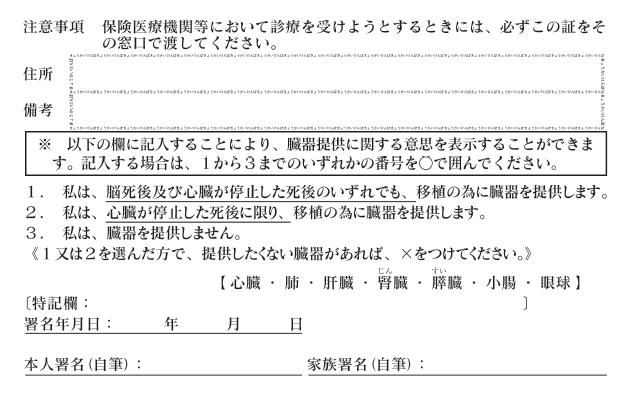
March 1st, 2022: From the Japan Health Insurance Association homepage
More information
Japan's public health insurance program
In Japan, there are cases where if you complete some paperwork you may get money back from the hospital. On the other hand, there are cases where even if you are enrolled in insurance your hospital bill may not become cheaper. Please make effort to properly understand the insurance system.
※For those whose country has a social security agreement with Japan relating to the public health insurance program, enrollment is not required.
【Applicable Countries】
・Germany
・United Kingdom
・Korea
・United States
・Belgium
・France
・Canada
・Australia
・The Netherlands
・The Czech Republic
・Spain
・Ireland
・Brazil
・Switzerland
・Hungary
・India
・Luxembourg
・The Philippines
・Slovakia
・China
・Finland - A payment collection letter (a letter asking me to quickly pay my insurance fees) for my National Health Insurance has arrived. What would happen if I left this alone and didn't pay?
-
If you cannot pay your insurance fees due to reasons such as your current life situation being difficult, absolutely make certain to go to the city hall or public office of your town or village and consult with them. If you do not pay and do not go to consult with your public office, you may become unable to use your insurance. Furthermore, if you continue to not pay without a special reason, you may become unable to use money you have in the bank. There is also a possibility that it may become difficult to renew your status of residence, so please be careful.
- I submitted some paperwork I received at my city hall to my country's embassy (consulate). I was told that for this paperwork I need an Authentication of Official Seals from the Ministry of Foreign Affairs of Japan.
-
The Authentication of Official Seals is when the Ministry of Foreign Affairs of Japan checks and authenticates paperwork from Japanese city halls and similar locations, to make sure they are real paperwork. Authenticated paperwork must be certified at foreign country embassies and consulates located in Japan. Check the Ministry of Foreign Affairs of Japan homepage for procedures regarding the Authentication of Official Seals.
- Is it possible to enroll my child from my home country into Japanese schools?
-
Although procedures differ depending on the age of the child, children can be enrolled in elementary schools, middle schools, and so on.
【When the child is 6-15 years of age】
In Japan, this is the age range for compulsory education. Although it is not compulsory for children who are foreign nationals, if you wish, children may study at Japanese elementary and middle schools. In the case of wishing to transfer in partway through the school year, consult with the Board of Education of your municipality.
【When the child is 15-18 years of age】
When transferring to a high school within Akita Prefecture from a high school in another prefecture or foreign country , consult with the Akita Prefectural Bureau of Education, Senior High School Education Division (Telephone: 018-860-5161).More information
regarding support for foreign national children and students who require Japanese language education (restricted to compulsory/public education)
Local government bodies provide the following types of support for foreign children and students who need Japanese language education.
While taking normal enrolled classes, extra teaching staff, Japanese language guidance instructors, or similar individuals will enter the class to accompany and provide guidance for the foreign national students. Alternatively, they may receive guidance, language instruction, and so on in other classrooms during normal class periods.
For details regarding this sort of support, ask the Board of Education of each municipality.
regarding children's Japanese language skills
For children whose native language is not Japanese, language barriers may become a large obstacle for studying at Japanese schools. Although Japanese language ability is a basic assumption for study at school, the language used in classes, textbooks, and so forth, will differ from the language one hears in everyday life. Besides feeling disoriented due to factors such as lifestyle environment changes, as well as culture and customs differences, language problems can become a psychological burden on children and may have a large impact on their individual character. If you feel support is needed for their Japanese language learning, consult first with the school.
- Can I drive a car in Japan using a driver's license from my home country?
-
Depending on your home country, there are both cases where you can drive in Japan and cases where you cannot. For details ask the Driving License Center.
Akita Prefectural Police Headquarters Driver License Center (for exams)
Telephone:018-862-7570More information
in case of changing a foreign country driver's license into a Japanese driver's license
After acquiring a driver's license in a foreign country and residing in that country for at least 3 months, it is possible to apply for that license to be changed to a Japanese driver's license if done so before the license's expiration date. At that time, in the case that driving skills, knowledge, and so forth are confirmed, and it is recognized that there are no impediments to your driving ability, you may be exempted from parts of written and/or practical tests. To see which countries are exempt, you can look at the National Police Agency's homepage.
National Police Agency homepage: "To those with foreign country driver's licenses"
For the application, a Japanese translation of the foreign driver's license provided by a foreign government office, an embassy or consulate of the home country in Japan, or the Japan Automobile Federation (JAF), will be necessary.
※If your case does not fall under that outlined above, you must acquire a Japanese driver's license. At a driving school in Japan, you must take lessons and undergo practical tests, and take a written test at the Driving License Center. In Akita Prefecture it is possible to take the test in Japanese (with furigana included) or in English.
For questions regarding the test at the license center, ask the Akita Prefectural Police Headquarters Driving License Center examiner (telephone: 018-862-7570).regarding foreign language textbooks when obtaining a driver's license in Japan
"RULES OF THE ROAD" (Published by JAF) is sold in English, Chinese, Spanish, and Portuguese. Exam questions are mostly taken from this textbook.
JAF Akita Branch
Telephone:018-864-8492 - If I get into a traffic accident, what are the first things I should do?
-
- Check if the place you are in is safe, and make sure there are no other dangers.
- Check if you or the people you got into an accident with have any injuries. If you have a large injury that prevents you from going to the hospital by yourself, immediately call an ambulance (telephone: 119).
- Call the police (telephone: 110). After the police confirm the situation of the accident, you will be able to receive a traffic accident certificate. You will need this certificate in order to receive any insurance money.
- Teach the people you got into an accident with your contact information, and make certain to ask for their contact information. If you are enrolled in automobile, bicycle, or similar insurance, don't forget to contact the insurance company as well.
Regarding traffic accident certificates and traffic accident consultation
The Japan Safe Driving Center issues traffic accident certificates. If you are enrolled with an insurance company, that company will do the paperwork for you to receive the traffic accident certificate. In the case you will do the paperwork yourself, you have several options including getting an application form at a nearby police station, or applying on the internet or at the office counter of the Japan Safe Driving Center.
Furthermore, there is also a traffic accident consultation counter where specialists can answer questions about matters such as insurance claims paperwork, consultations related to accidents caused by children, and so on. Do not judge by yourself, and don't accept without question the opinions of others. Instead, if there is anything you want to know, consult with a professional.
Akita Prefectural Consumer Affair's Center, Traffic Accident Consultation Counter
TEL:018-836-7804 or 018-836-7805 - Check if the place you are in is safe, and make sure there are no other dangers.
- I want to learn more about living in Japan, but reading Japanese is hard. Is it possible to learn about life in Japan in my home country's language?
-
Read the guidebook created by the Immigration Services Agency of Japan. It is called the Guidebook on Living and Working: For Foreign Nationals Who Start Living in Japan. Inside, there are all sorts of things necessary for daily life in Japan written in the languages of various countries, as well as in easy to understand Japanese.
- I am looking for someone who will translate or interpret for me. Where can I be introduced to such people?
-
The Akita International Association (AIA) can introduce people who can translate, interpret, and provide other services.
First, contact the AIA with the time, place, and contents of your request. There is a fee for these services.
Akita International Association (AIA)
Telephone: 018-893-5499
For those who wish to request for work from an AIA community supporter - I have received a My Number. At what sorts of times is this used?
-
Every resident of Japan has a 12 digit personalized My Number. It is used for various procedures, including pension, taxes, and medical care. Even as a foreign national, if you have a certification of residence in Japan, you will have a My Number issued to you.
Various information about you can be learned through this number. It is a very important number, and if it is not clear what someone needs it for, you should not teach it to someone else. The card with your My Number written on it is also precious, so do not lose it.
- Questions related to the My Number system
Telephone: 0120-0178-26
Available days and times: 9:30-20:00(Weekdays) / 9:30-17:30(Weekends and holidays)
Available languages:English, Chinese, Korean, Spanish, Portuguese
- If you lost the card with your My Number written on it
Telephone: 0120-0178-27
Available days and times:Always available, any time, any day
Available languages: English, Chinese, Korean, Spanish, Portuguese
- My Number General Site
https://www.kojinbango-card.go.jp/
You can read explanations about the My Number Card in English, Chinese, Korean, Spanish, and Portuguese.
- Questions related to the My Number system
- Question counters related to status of residence
-
・Sendai Regional Immigration Bureau, Akita Branch Office(consultation only available in Japanese)
Telephone:018-895-5221
Available days and times:9:00-12:00、13:00-16:00(Weekdays only)
Available languages and days for calling
・Consultation Support Center for Foreign Residents(consultation available in foreign languages)
Telephone:03-3202-5535 / 03-5155-4039
Available days and times:9:00-16:00(Weekdays only)
※Not open on the 2nd and 4th Wednesday of every month.Monday Tuesday Wednesday Thursday Friday Chinese ○ ○ ○ ○ ○ English ○ ○ ○ ○ ○ Spanish ○ ○ ○ Portuguese ○ ○ ○ Indonesian ○ Vietnamese ○ ○ Tagalog ○
・Immigration Information Center(consultation available in foreign languages)
Telephone:0570-013904 (If calling from overseas or using IP or PHS phone service, dial 03-5796-7112)
Available days and times:8:30-17:15(Weekdays only)
Available languages:English, Chinese, Korean, Vietnamese, Filipino, Nepali, Indonesian, Thai, Khmer, etc. - Contact information for embassies and consulates
-
Country Name of Embassy or Consulate Phone Numbe China Consulate-General of the People's Republic of China in Sapporo 011-563-5563 Consulate-General of the People's Republic of China in Niigata 025-228-8888 Philippines Embassy of the Republic of the Philippines 03-5562-1600 South Korea Consulate-General of the Republic of Korea in Sendai 022-221-2751
United States of America
U.S. Consulate-General in Sapporo011-641-1115
011-641-1116
011-641-1117
Vietnam
Embassy of the Socialist Republic of Vietnam in Japan03-3466-3311
03-3466-3313
03-3466-3314Thailand Royal Thai Embassy in Japan 03-5789-2433 Indonesia Embassy of the Republic of Indonesia 03-3441-4201
For embassies and consulates of other countries, check the list of "Foreign Missions in Japan". - List of things to do from pregnancy until birth
-
①Things to prepare from submitting the pregnancy notice until birth
Receive a maternal and child health handbook
After submitting the pregnancy notice, you can receive a maternal and child health handbook. This handbook will keep track of various things, such as the mother's health and the baby's growth. Coupons that can make hospital examinations (bodily checkups) cheaper or free can also be received with this handbook. The handbook itself does not cost money. You can buy foreign language maternal and child health handbooks on the internet.
Search for a hospital to give birth at
You can give birth at a hospital with a maternity division or an obstetrics and gynecology department. Once you know you are pregnant, quickly make a reservation for giving birth.
Get checkups for the mother and unborn baby (examination)
Every month, get checkups at the hospital to check the health of the mother and baby.
Do paperwork to receive the Childbirth Lump Sum Grant
In Japan, it costs around ¥500,000 to give birth. If you are enrolled in health insurance, you can receive a childbirth lump sum grant payment of ¥420,000.
Take part in mother/father (papa, mama) classes
These are classes that teach you about childbirth, raising the child, and more. The city, town, or village where you live holds these classes. There are also cases where these classes are held at the hospitals where children are born.
Bodily changes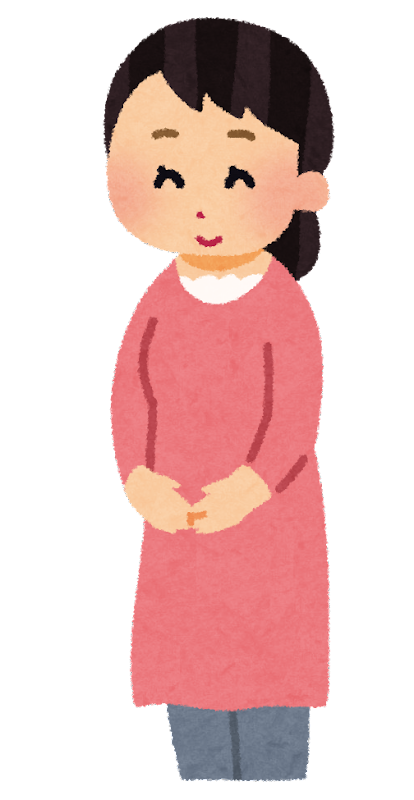


First Trimester
(From 1 to 4 months)Second Trimester
(From 5 to 7 months)Third Trimester
(From 8 to 10 months)When morning sickness (when you feel bad) becomes difficult, and you can't retain fluids, go to the hospital. Be careful of anemia (when your body's iron becomes low). If you feel like your belly is painfully expanding, rest immediately. If the feeling continues, go to a hospital. ②Things to do after the baby is born
★Do paperwork at the public office of the city, town, or village where you live★
Submit a birth registration
Within 14 days after the baby is born, submit a birth registration to the city hall or public office of the town or village you live in. After that, if there is some necessary paperwork for the Immigration Services Agency of Japan, be sure to receive a Certificate of Acceptance of Birth Report, and a Certificate of Residence (which includes the name of the baby).
Receive a Welfare and Medical Beneficiary Certificate (Marufuku Card)
With this card, children of 0 years of age can go to the hospital for free.
Do the paperwork to receive child allowance
Child allowance is money used for raising a child.
★Do paperwork for the Immigration Services Agency of Japan, your embassy, and so on★
Obtain a status of residence, citizenship, and so on
If both the father and mother are foreign nationals, apply for residence permission within 30 days of the baby being born. Also, do the paperwork at an embassy (consulate) to obtain the baby's citizenship.
③Things to do for the health of the baby and mother
1 month checkup
Get a checkup for the condition of the baby's body, growth, and so on at the hospital where the baby was born.
Baby home visit
A midwife, public health nurse, or other professional will visit the home to check if the baby and mother are well. This is also a chance to consult about anything troubling you.
Get vaccinations
Around 2 months after the baby is born, begin getting shots to protect against getting sick.
Infant examinations
Get the baby's growth checked at places like hospitals. This will be done several times, such as when the baby is 4 months old, 7 months old, and 10 months old. The timing and place to get these examinations done will vary depending on the city, town, or village.
※Depending on the person, there are cases where the items in this list may not apply. Use this list as a reference, and check what is needed for your situation ahead of time. - List of contact information for Hello Work
-
Hello Work office (region) Phone Number Address Hello Work Kazuno 0186-23-2173 Arata 82-4 Hanawa, Kazuno City Hello Work Odate 0186-42-2531 Shimizu 1-5-20 Odate City Hello Work Takanosu 0186-60-1586 Higashinakatai 26-1 Takanosu, Kitaakita City Hello Work Noshiro 0185-54-7311 Midorimachi 5-29 Noshiro City Hello Work Oga 0185-23-2411 Shinhamacho 1-3 Funagawa, Funagawa Port, Oga City Hello Work Akita 018-864-4111 Barajima 1-12-16 Akita City Hello Work Plaza Atorion 018-836-7820 Nakadori 2-3-8 Akita City (Atorion 3rd Floor) Hello Work Plaza Goshono 018-889-8609 Jizoden 3-1-1 Goshono, Akita City (Akita Terrsa 3rd Floor) Hello Work Honjo 0184-22-3421 Tajirino 18-1 Ishiwaki, Yurihonjo City Hello Work Omagari 0187-63-0335 Omagarisumiyoshicho 33-3 Daisen City Hello Work Kakunodate 0187-54-2434 Kodate 32-3 Kakunodatemachi, Semboku City Hello Work Yokote 0182-32-1165 Asahikawa 1-2-26 Yokote City Hello Work Yuzawa 0183-73-6117 Shimizucho 4-4-3 Yuzawa City - Labor Standards Inspection Offices
-
Name Phone Number Jurisdiction Akita Labor Standards Inspection Office 018-865-3671 Akita City
Oga City
Katagami City
Minamiakita DistrictOdate Labor Standards Inspection Office 0186-42-4033 Odate City
Kazuno City
Kitaakita City
Kazuno District
Kitaakita DistrictNoshiro Labor Standards Inspection Office 0185-52-6151 Noshiro City
Yamamoto DistrictHonjo Labor Standards Inspection Office 0184-22-4124 Yurihonjo City
Nikaho CityOmagari Labor Standards Inspection Office 0187-63-5151 Daisen City
Semboku City
Semboku DistrictYokote Labor Standards Inspection Office 0182-32-3111 Yokote City
Yuzawa City
Ogachi District - List of Akita Prefecture Boards of Education
-
Board of Education Name Phone Number Fax Number Akita Prefectural Board of Education 018-860-5111 018-860-5851 Akita City Board of Education 018-888-5803 018-888-5804 Noshiro City Board of Education 0185-73-2757 0185-73-6459 Yokote City Board of Education 0182-32-2402 0182-32-4034 Odate City Board of Education 0186-43-7111 0186-54-6100 Oga City Board of Education 0185-24-9100 0185-24-9156 Yuzawa City Board of Education 0183-73-2161 0183-72-8515 Kazuno City Board of Education 0186-30-0290 0186-30-1140 Yurihonjo City Board of Education 0184-32-1306 0184-33-3381 Katagami City Board of Education 018-853-5361 018-853-5277 Daisen City Board of Education 0187-63-1111 0187-63-7131 Kitaakita City Board of Education 0186-62-6616 0186-63-2678 Nikaho City Board of Education 0184-38-2259 0184-38-2252 Semboku City Board of Education 0177-43-3381 0187-47-2244 Kosaka Town Board of Education 0186-29-2342 0186-29-4436 Kamikoani Village Board of Education 0186-60-9000 0186-77-3223 Fujisato Town Board of Education 0185-79-1327 0185-79-2227 Mitane Town Board of Education 0185-87-2115 0185-87-3052 Happo Town Board of Education 0185-77-2816 0185-77-3230 Gojome Town Board of Education 018-852-5372 018-852-5370 Hachirogata Town Board of Education 018-875-5812 018-875-5950 Ikawa Town Board of Education 018-874-4424 018-874-2924 Ogata Village Board of Education 0185-45-3240 0185-45-2661 Misato Town Board of Education 0187-84-4914 0187-85-3102 Ugo Town Board of Education 0183-62-211 0183-62-3334 Higashinaruse Village Board of Education 0182-47-345 0182-47-2119 ※Information current as of April 1st, 2021









